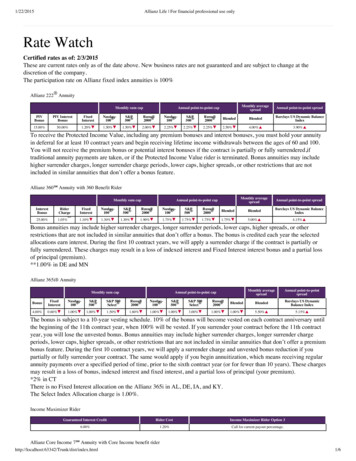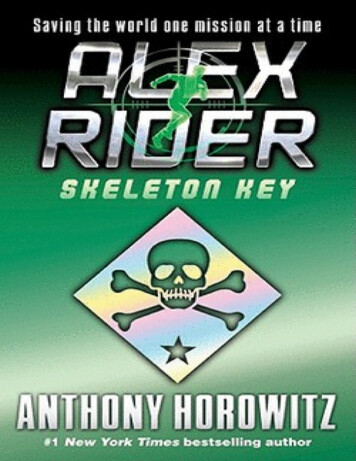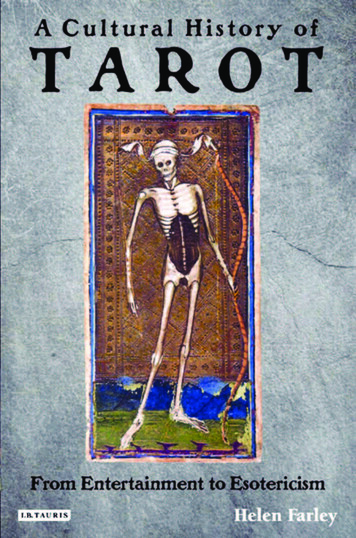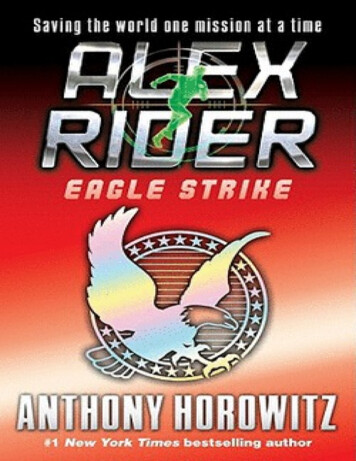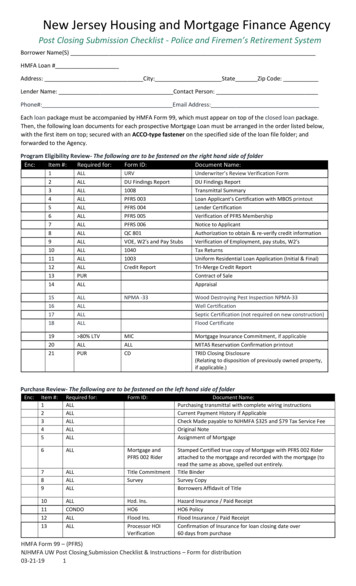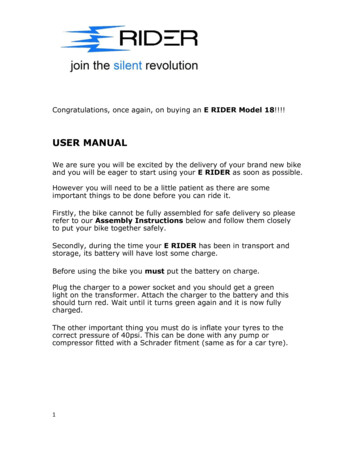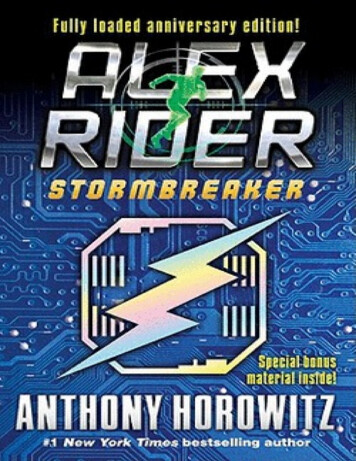
Transcription
StormbreakerAlex Rider [1]Anthony HorowitzPutnam Publishing Group (2011)From Publishers WeeklyReaders will cheer for Alex Rider, the 14-year-old hero of British author Horowitz's spy thriller (thefirst in a projected series). When his guardian and uncle, Ian, is mysteriously killed, Alex discoversthat his uncle was not the bank vice-president he purported to be, but rather a spy for the Britishgovernment. Now the government wants Alex to take over his uncle's mission: investigating SayleEnterprises, the makers of a revolutionary computer called Stormbreaker. The company's head plansto donate one to every secondary school in England, but his dealings with unfriendly countries and IanRider's murder have brought him under suspicion. Posing as a teenage computer whiz who's won aStormbreaker promotional contest, Alex enters the factory and immediately finds clues from his uncle.Satirical names abound (e.g., Mr. Grin, Mr. Sayle's brutish butler, is so named for the scars hereceived from a circus knife-throwing act gone wrong) and the hard-boiled language is equallyoutrageous ("It was a soft gray night with a half-moon forming a perfect D in the sky. D for what, Alexwondered. Danger? Discovery? Or disaster?"). These exaggerations only add to the fun, as do thecreative gadgets that Alex uses, including a metal-munching cream described as "Zit-Clean. ForHealthier Skin." The ultimate mystery may be a bit of a letdown, but that won't stop readers fromracing through Alex's adventures, from a high-speed bike chase to a death-defying dance with aPortuguese man-of-war. The audience will stay tuned for his next assignment, Point Blanc, due outspring 2002. Ages 10-up.Copyright 2001 Cahners Business Information, Inc.From School Library JournalGr 5-9-Alex Rider's world is turned upside down when he discovers that his uncle and guardian hasbeen murdered. The 14-year-old makes one discovery after another until he is sucked into his uncle'sundercover world. The Special Operations Division of M16, his uncle's real employer, blackmailsthe teen into serving England. After two short weeks of training, Alex is equipped with severalspecial toys like a Game Boy with unique cartridges that allow it to scan, fax, and emit smoke bombs.Alex's mission is to complete his uncle's last assignment, to discover the secret that Herod Sayle ishiding behind his generous donation of one of his supercomputers to every school in the country.When Alex enters Sayle's compound in Port Tallon, he discovers a strange world of secrets andvillains including Mr. Grin, an ex-circus knife catcher, and Yassen Gregorovich, professional hitman. The novel provides bang after bang as Alex experiences and survives unbelievably dangerousepisodes and eventually crashes through the roof of the Science Museum to save the day. Alex is astrong, smart hero. If readers consider luck the ruling factor in his universe, they will love this JamesBond-style adventure. With short cliff-hanger chapters and its breathless pace, it is an excellent
choice for reluctant readers. Warning: Suspend reality.Lynn Bryant, formerly at Navarre High School, FLCopyright 2001 Cahners Business Information, Inc.SUMMARY:They told him his uncle died in a car accident. But fourteen-year-old Alex knows that's a lie, and thebullet holes in his uncle's windshield confirm his suspicions. But nothing could prepare him for thenews that the uncle he always thought he knew was really a spy for MI6-Britain's top secretintelligence agency. Recruited to find his uncle's killers and complete his final mission, Alexsuddenly finds himself caught in a deadly game of cat and mouse. "What if James Bond had startedspying as a teenager? Non-stop action keeps the intrigue boiling." (Kirkus Reviews)SUMMARY:They told him his uncle died in a car accident. But fourteen-year-old Alex knows that's a lie, and thebullet holes in his uncle's windshield confirm his suspicions. But nothing could prepare him for thenews that the uncle he always thought he knew was really a spy for MI6-Britain's top secretintelligence agency. Recruited to find his uncle's killers and complete his final mission, Alexsuddenly finds himself caught in a deadly game of cat and mouse. "What if James Bond had startedspying as a teenager? Non-stop action keeps the intrigue boiling." (Kirkus Reviews)
FUNERAL VOICESWHEN THE DOORBELL rings at three in the morning, it’s never good news.Alex Rider was woken by the first chime. His eyes flickered open, but for a moment he stayedcompletely still in his bed, lying on his back with his head resting on the pillow. He heard a bedroomdoor open and a creak of wood as somebody went downstairs. The bell rang a second time, and helooked at the alarm clock glowing beside him. There was a rattle as someone slid the security chainoff the front door.He rolled out of bed and walked over to the open window, his bare feet pressing down the carpetpile. The moonlight spilled onto his chest and shoulders. Alex was fourteen, already well built, withthe body of an athlete. His hair, cut short apart from two thick strands hanging over his forehead, wasfair. His eyes were brown and serious. For a moment he stood silently, half hidden in the shadow,looking out. There was a police car parked outside. From his second-floor window Alex could seethe black ID number on the roof and the caps of the two men who were standing in front of the door.The porch light went on and, at the same time, the door opened.“Mrs. Rider?”“No. I’m the housekeeper. What is it? What’s happened?”“This is the home of Mr. Ian Rider?”“Yes.”“I wonder if we could come in ”And Alex already knew. He knew from the way the police stood there, awkward and unhappy. But healso knew from the tone of their voices. Funeral voices that was how he would describe themlater. The sort of voices people use when they come to tell you that someone close to you has died.He went to his door and opened it. He could hear the two policemen talking down in the hall, but onlysome of the words reached him.“ a car accident called the ambulance intensive care nothing anyone could do sosorry.”It was only hours later, sitting in the kitchen, watching as the gray light of morning bled slowlythrough the West London streets, that Alex could try to make sense of what had happened. His uncle—Ian Rider—was dead. Driving home, his car had been hit by a truck at Old Street roundabout and hehad been killed almost instantly. He hadn’t been wearing a seat belt, the police said. Otherwise, hemight have had a chance.Alex thought of the man who had been his only relation for as long as he could remember. He hadnever known his own parents. They had both died in another accident, this one a plane crash, a fewweeks after he had been born. He had been brought up by his father’s brother (never “uncle”—IanRider had hated that word) and had spent fourteen years in the same terraced house in Chelsea,London, between the King’s Road and the river. The two of them had always been close. Alex
remembered the vacations they’d taken together, the many sports they’d played, the movies they’dseen. They hadn’t just been relations, they’d been friends. It was almost impossible to imagine that hewould never again see the man, hear his laughter, or twist his arm to get help with his sciencehomework.Alex sighed, fighting against the sense of grief that was suddenly overwhelming. But what saddenedhim the most was the realization—too late now—that despite everything, he had hardly known hisuncle at all.He was a banker. People said Alex looked a little like him. Ian Rider was always traveling. A quiet,private man who liked good wine, classical music, and books. Who didn’t seem to have anygirlfriends in fact, he didn’t have any friends at all. He had kept himself fit, had never smoked, andhad dressed expensively.But that wasn’t enough. It wasn’t a picture of a life. It was only a thumbnail sketch.“Are you all right, Alex?” A young woman had come into the room. She was in her late twenties witha sprawl of red hair and a round, boyish face. Jack Starbright was American. She had come toLondon as a student seven years ago, rented a room in the house in return for light housework andbaby-sitting duties and had stayed on to become housekeeper and one of Alex’s closest companions.Sometimes he wondered what the Jack was short for. Jackie? Jacqueline? Neither of them suited herand although he had once asked, she had never said.Alex nodded. “What do you think will happen?” he asked.“What do you mean?“To the house. To me. To you.”“I don’t know.” She shrugged. “I guess Ian would have made a will,” she said. “He’ll have leftinstructions.”“Maybe we should look in his office.”“Yeah. But not today, Alex. Let’s take it one step at a time.”Ian’s office was a room running the full length of the house, high up on the top—It was the only roomthat was always locked—Alex had only been in there three or four times, and never on his own. Whenhe was younger, he had fantasized that there might be something strange up there a time machine ora UFO.But it was merely an office with a desk, a couple of filing cabinets, shelves full of papers and books.Bank stuff—that’s what Ian said. Even so, Alex wanted to go up there now.“The police said he wasn’t wearing his seat belt.” Alex turned to look at Jack.She nodded. “Yeah. That’s what they said.”“Doesn’t that seem strange to you? You know how careful he was. He always wore his seat belt. Hewouldn’t even drive me around the corner without making me put mine on.”Jack thought for a moment, then shrugged. “Yeah, it is strange,” she said. “But that must have been theway it was. Why would the police have lied?”The day dragged on. Alex hadn’t gone to school even though, secretly, he wanted to. He would have
preferred to escape back into normal life, the clang of the bell, the crowds of familiar faces, insteadof sitting here, trapped inside the house. But he had to be there for the visitors who came throughoutthe morning and the rest of the afternoon.There were five of them. A lawyer who knew nothing about any will but seemed to have beencharged with organizing the funeral. A funeral director who had been recommended by the lawyer. Avicar—tall, elderly—who seemed disappointed that Alex refused to cry. A neighbor from across theroad—how did she even know that anyone had died? And finally a man from the bank.“All of us at the Royal and General are deeply shocked,” he said. He looked about thirty, wearing apolyester suit with a Marks & Spencer tie. He had the sort of face you forget even while you’relooking at it and had introduced himself as Crawley, from personnel. “But if there’s anything we cando ”“What will happen?” Alex asked for the second time that day.“You don’t have to worry,” Crawley said. “The bank will take care of everything. That’s my job. Youleave everything to me.”The day passed. Alex killed a couple of hours knocking a few balls around on his uncle’s snookertable and then felt vaguely guilty when Jack caught him at it. But what else was he to do? Later on shetook him to a Burger King. He was glad to get out of the house, but the two of them barely spoke. Alexassumed Jack would have to go back to America. She certainly couldn’t stay in London forever. Sowho would look after him? At fourteen, he was still too young to look after himself. His whole futurelooked so uncertain that he preferred not to talk about it. He preferred not to talk at all.And then the day of the funeral arrived and Alex found himself dressed in a dark jacket and cords,preparing to leave in a black car that had come from nowhere surrounded by people he had never met.Ian Rider was buried in Brompton Cemetery on the Fulham Road, just in the shadow of the Chelseasoccer field, and Alex knew where he would have preferred to be on that warm Wednesdayafternoon. About thirty people had turned up, but he hardly recognized any of them. A grave had beendug close to the lane that ran the length of the cemetery, and as the service began, a black Rolls-Roycedrew up, the back door opened, and a man got out. Alex watched him as he walked forward andstopped. Alex shivered. There was something about the new arrival that made his skin crawl.And yet the man was ordinary to look at. Gray suit, gray hair, gray lips, and gray eyes. His face wasexpressionless, the eyes behind the square, gunmetal spectacles, completely empty. Perhaps that waswhat had disturbed Alex. Whoever this man was, he seemed to have less life than anyone in thecemetery. Above or below ground.Someone tapped Alex on the shoulder and he turned around to see Mr. Crawley leaning over him.“That’s Mr. Blunt,” the personnel manager whispered. “He’s the chairman of the bank.”Alex’s eyes traveled past Blunt and over to the Rolls-Royce. Two more men had come with him, oneof them driving. They were wearing identical suits and, although it wasn’t a particularly bright day,sunglasses. Both of them were watching the funeral with the same grim faces. Alex looked from themto Blunt and then to the other people who had come to the cemetery. Had they really known Ian Rider?Why had he never met any of them before? And why did he find it so difficult to believe that theyreally worked for a bank?“He is a good man, a patriotic man. He will be missed.”
The vicar had finished his graveside address. His choice of words struck Alex as odd. Patriotic? Thatmeant he loved his country. But as far as Alex knew, Ian Rider had barely spent any time in it.Certainly he had never been one for waving the Union Jack. He looked around, hoping to find Jack,but saw instead that Blunt was making his way toward him, stepping carefully around the grave.“You must be Alex.” The chairman was only a little taller than him. Up close, his skin was strangelyunreal.It could have been made of plastic. “My name is Alan Blunt,” he said. “Your uncle often spoke aboutyou.”“That’s funny,” Alex said. “He never mentioned YOU.”The gray lips twitched briefly. “We’ll miss him. He was a good man.”“What was he good at?” Alex asked. “He never talked about his work.”Suddenly Crawley was there. “Your uncle was overseas finance manager, Alex,” he said. “He wasresponsible for our foreign branches. You must have known that.”“I know he traveled a lot,” Alex said. “And I know he was very careful. About things like seat belts.”“Well, sadly, he wasn’t careful enough.” Blunt’s eyes, magnified by the thick lenses of his spectacles,lasered into his own, and for a moment, Alex felt himself pinned down, like an insect under amicroscope. “I hope we’ll meet again,” Blunt went on. He tapped the side of his face with a singlegray finger. “Yes ” Then he turned and went back to his car.That was when it happened. As Blunt was getting into the Rolls-Royce, the driver leaned down toopen the back door and his jacket fell open, revealing a stark white shirt underneath. There was ablack shape lying against it and that was what caught Alex’s eye. The man was wearing a leatherholster with an automatic pistol strapped inside. Realizing what had happened, the driver quicklystraightened up and pulled the jacket across. Blunt had seen it too. He turned back and looked again atAlex. Something very close to an emotion slithered over his face. Then he got into the car, the doorclosed, and he was gone.A gun at a funeral, Alex thought. Why? Why should bank managers carry guns?“Let’s get out of here.” Suddenly Jack was at his side. “Cemeteries give me the creeps.”“Yes. And quite a few creeps have turned up,” Alex muttered.They slipped away quietly and went home. The car that had taken them to the funeral was stillwaiting, but they preferred the open air. The walk took them fifteen minutes and as they turned thecorner onto their street, Alex noticed a moving van parked in front of the house, the words STRYKER& SON painted on its side.“What’s that doing ?” he began.At the same moment, the van shot off, the wheels skidding over the surface of the road.Alex said nothing as Jack unlocked the door and let them in, but while she went into the kitchen tomake some tea, he quickly looked around the house. A letter that had been on the hall table now lay onthe carpet. A door that had been half open was now closed. Tiny details, but Alex’s eyes missednothing.
Somebody had been in the house. He was almost sure of it.But he wasn’t certain until he got to the top floor. The door to the office, which had always, alwaysbeen locked, was now unlocked. Alex opened it and went in. The room was empty. Ian Rider hadgone and so had everything else. The desk drawers, the closets, the shelves anything connected tothe dead man’s work had been taken. Whatever the truth was about his uncle’s past, someone had justwiped it out.
HEAVEN FOR CARSWITH HAMMERSMITH BRIDGE just ahead of him, Alex left the river and swung his bike throughthe lights and down the hill toward Brookland School. The bike was a Condor Junior Roadracer,custom built for him on his twelfth birthday. It was a teenager’s bike, with a cut down Reynolds 531frame, but the wheels were fullsize so he could ride at speed with hardly any rolling resistance. Hespun past a delivery van and passed through the school gates. He would be sorry when he grew out ofthe bike. For two years now it had almost been part of him.He double locked it in the shed and went into the yard. Brookland was a modern school, all redbrickand, to Alex’s eye, rather ugly. He could have gone to any of the exclusive private schools aroundChelsea, but Ian Rider had decided to send him here. He had said it would be more of a challenge.The first period of the day was algebra. When Alex came into the classroom, the teacher, Mr.Donovan, was already chalking up a complicated equation on the board. It was hot in the room, thesun streaming in through the floor-to-ceiling windows, put in by architects who should have knownbetter. As Alex took his place near the back, he wondered how he was going to get through the lesson.How could he possibly think about algebra when there were so many other questions churning throughhis mind?The gun at the funeral. The way Blunt had looked at him. The van with STRYKER & SON written onthe side. The empty office. And the biggest mystery of all, the one detail that refused to go away. Theseat belt.Ian Rider hadn’t been wearing a seat belt.But of course he had. Ian Rider had never been one to give lectures. He had always said Alex shouldmake up his own mind about things. But he’d had this thing about seat belts. The more Alex thoughtabout it, the less he believed it. A collision in the middle of the city. Suddenly he wished he could seethe car. At least the wreckage would tell him that the accident had really happened, that Ian Rider hadreally died that way.“Alex?”Alex looked up and realized that everyone was staring at him. Mr. Donovan had just asked himsomething.He quickly scanned the blackboard, taking in the figures. “Yes, Sir,” he said. “X equals seven and Yis fifteen.”The math teacher sighed. “Yes, Alex. You’re absolutely right. But actually I was just asking you toopen the window ”Somehow he managed to get through the rest of the day, but by the time the final bell rang, his mindwas made up. While everyone else streamed out, he made his way to the secretary’s office andborrowed a copy of the Yellow Pages.“What are you looking for?” the secretary asked. Miss Bedfordshire had always had a soft spot forAlex.
“Auto junkyards ” Alex flicked through the pages. “If a car got smashed up near Old Street, they’dtake it somewhere near, wouldn’t they?”“I suppose so.”“Here ” Alex had found the yards listed under “Auto Wreckers.” But there were dozens of themfighting for attention over four pages.“Is this for a school project?” the secretary asked. She knew Alex had lost a relative, but not how.“Sort of ” Alex was reading the addresses, but they told him nothing.“This one’s quite near Old Street.” Miss Bedfordshire pointed at the corner of the page.“Wait!” Alex tugged the book toward him and looked at the entry underneath the one the secretary hadchosen:J. B. STRYKER. AUTO WRECKERSHeaven for CarsCALL US TODAY“That’s in Vauxhall,” Miss Bedfordshire said. “Not too far from here.”“I know.” But Alex had recognized the name. J. B. Stryker. He thought back to the van he had seenoutside his house on the day of the funeral. Stryker & Son. Of course it might just be a coincidence,but it was still somewhere to start. He closed the book. “I’ll see you, Miss Bedfordshire.”“Be careful.” The secretary watched Alex leave, wondering why she had said that. Maybe it was hiseyes.Dark and serious, there was something dangerous there. Then the telephone rang and she forgot him asshe went back to work.J. B. Stryker’s was a square of wasteland behind the railway tracks running out of Waterloo Station.The area was enclosed by a high brick wall topped with broken glass and razor wire. Two woodengates hung open, and from the other side of the road, Alex could see a shed with a security windowand beyond it the tottering piles of dead and broken cars. Everything of any value had been strippedaway and only the rusting carcasses remained, heaped one on top of the other, waiting to be fed intothe crusher.There was a guard sitting in the shed, reading a newspaper. In the distance a bulldozer coughed intolife, then roared down on a battered Ford Taurus, its metal claw smashing through the window toscoop up the vehicle and carry it away. A telephone rang somewhere in the shed and the guard turnedaround to answer it. That was enough for Alex. Holding his bike and wheeling it along beside him, hesprinted through the gates.He found himself surrounded by dirt and debris. The smell of diesel was thick in the air and the roarof the engines was deafening. Alex watched as a crane swooped down on one of the cars, seized it ina metallic grip, and dropped it into a crusher. For a moment the car rested on a pair of shelves. Thenthe shelves lifted up, toppling the car over and down into a trough. The operator—sitting in a glasscabin at one end of the crusher pressed a button and there was a great belch of black smoke. Theshelves closed in on the car like a monster insect folding in its wings. There was a grinding sound as
the car was crushed until it was no bigger than a rolled-up carpet. Then the operator threw a gear andthe car was squeezed out, metallic toothpaste being chopped up by a hidden blade. The slices tumbledto the ground.Leaving his bike propped against the wall, Alex ran farther into the yard, crouching down behind thewrecks. With the din from the machines, there was no chance that anyone would hear him, but he wasstill afraid of being seen. He stopped to catch his breath, drawing a grimy hand across his face. Hiseyes were watering from the diesel fumes. The air was as filthy as the ground beneath him.He was beginning to regret coming—but then he saw it. His uncle’s BMW was parked a few yardsaway, separated from the other cars. At first glance it looked absolutely fine, the metallic silverbodywork not even scratched. Certainly there was no way that this car could have been involved in afatal collision with a truck or with anything else. But it was definitely his uncle’s car. Alexrecognized the license plate. He hurried closer and it was now that he saw that the car was damagedafter all. The windshield had been smashed, along with all the windows on the driver’s side. Alexmade his way around to the other side. And froze.Ian Rider hadn’t died in any accident. What had killed him was plain to see—even to someone whohad never seen such a thing before. A spray of bullets had caught the car full on the driver’s side,shattering the front tire, smashing the windshield and side windows, and punching into the sidepanels. Alex ran his fingers over the holes. The metal felt cold against his flesh. He opened the doorand looked inside. The front seats pale gray leather, were strewn with fragments of broken glass andstained with patches of dark brown. He didn’t need to ask what the stain was. He could seeeverything. The flash of the machine gun, the bullets ripping into the car, Ian Rider jerking in thedriver’s seat But why? Why kill a bank manager? And why had the murder been covered up? It was the police whohad delivered the news that night, so they must be part of it. Had they lied deliberately? None of itmade sense.“You should have gotten rid of it two days ago. Do it now ”The machines must have stopped for a moment. If there hadn’t been a sudden lull, Alex would neverhave heard the men coming. Quickly he looked across the steering wheel and out the other side. Therewere two of them, both dressed in loose-fitting overalls. Alex had a feeling he’d seen them before. Atthe funeral. One of them was the driver, the man he had seen with the gun. He was sure of it.Whoever they were, they were only a few paces away from the car, talking in low voices. Anotherfew steps and they would be there. Without thinking, Alex threw himself into the only hiding placeavailable: inside the car itself. Using his foot, he hooked the door and closed it. At the same time, hebecame aware that the machines had started again and he could no longer hear the men. He didn’tdare look up. A shadow fell across the window as the two men passed. But then they were gone. Hewas safe.And then something hit the BMW with such force that Alex cried out, his whole body caught in amassive shock wave that tore him away from the steering wheel and threw him helplessly into theback. The roof buckled and three huge metal fingers tore through the skin of the car like a fork throughan eggshell, trailing dust and sunlight. One of the fingers grazed the side of his head any closer andit would have cracked his skull. Alex yelled as blood trickled over his eye. He tried to move, then
was jerked back a second time as the car was yanked off the ground and tilted high up in the air.He couldn’t see. He couldn’t move. But his stomach lurched as the car swung in an arc, the metalgrinding and the light spinning. The BMW had been picked up by the crane. It was going to be putinside the crusher. With him inside.He tried to raise himself up, to wave through the windows. But the claw of the crane had alreadyflattened the roof, pinning his left leg, perhaps even breaking it. He could feel nothing. He lifted ahand and managed to pound on the back window, but he couldn’t break the glass. Even if the workmenwere staring at the BMW, they would never see anything moving inside.His short flight across the junkyard ended with a bone-shattering crash as the crane deposited the caron the iron shelves of the crusher. Alex tried to fight back his sickness and despair and think of whatto do.Any moment now the operator would send the car tipping into the coffin-shaped trough. The machinewas a Lefort Shear, a slow-motion guillotine. At the press of a button, the two wings would close onthe car with a joint pressure of five hundred tons. The car, with Alex inside it, would be crushedbeyond recognition. And the broken metal—and flesh—would then be chopped into sections. Nobodywould ever know what had happened.He tried with all his strength to free himself. But the roof was too low. His leg was trapped. Then hiswhole world tilted and he felt himself falling into darkness. The shelves had lifted. The BMW slid toone side and fell the few yards into the trough. Alex felt the metalwork collapsing all around him. Theback window exploded and glass showered around his head, dust and diesel fumes punching into hisnose and eyes.There was hardly any daylight now, but looking out of the back, he could see the huge steel head ofthe piston that would push what was left of the car through the exit hole on the other side.The engine tone of the Lefort Shear changed as it prepared for the final act. The metal wingsshuddered. In a few seconds’ time the two of them would meet, crumpling the BMW like a paper bag.Alex pulled with all his strength and was astonished when his leg came free. It took him perhaps asecond—one precious second—to work out what had happened. When the car had fallen into the trough, ithad landed on its side. The roof had buckled again just enough to free him. His hand scrabbled for thedoor—but, of course, that was useless. The doors were too bent. They would never open. The back window!With the glass gone, he could crawl through the frame, but only if he moved fast.The wings began to move. The BMW screamed as two walls of solid steel relentlessly crushed it.More glass shattered. One of the wheel axles snapped with the sound of a thunderbolt. Darknessbegan to close in.Alex grabbed hold of what was left of the backseat. Ahead of him he could see a single triangle oflight, shrinking faster and faster. He could feel the weight of the two walls pressing down on him. Thecar was no longer a car but the fist of some hideous monster snatching at the insect that Alex hadbecome.
With all his strength, he surged forward. His shoulders passed through the triangle, out into the light.Next came his legs, but at the last moment his shoe caught on a piece of jagged metal. He jerked andthe shoe was pulled off, falling back into the car. Alex heard the sound of the leather being squashed.Finally, clinging to the black, oily surface of the observation platform at the back of the crusher, hedragged himself clear and managed to stand up.He found himself face-to-face with a man so fat that he could barely fit into the small cabin of thecrusher.The man’s stomach was pressed against the glass, his shoulders squeezed into the corners. A cigarettedangled on his lower lip as his mouth fell open and his eyes stared. What he saw was a boy in therags of what had once been a school uniform. A whole sleeve had been torn off and his arm, streakedwith blood and oil, hung limply by his side. By the time the operator had taken this all in, come to hissenses, and turned the machin
Readers will cheer for Alex Rider, the 14-year-old hero of British author Horowitz's spy thriller (the first in a projected series). When his guardian and uncle, Ian, is mysteriously killed, Alex discovers that his uncle was not t
